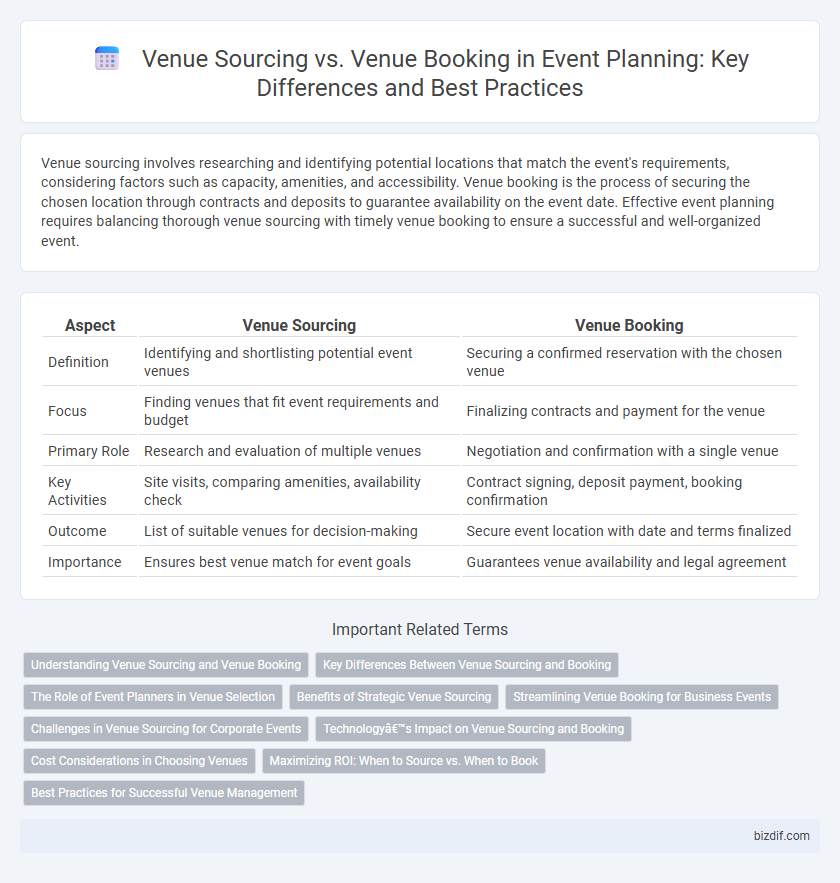Venue sourcing involves researching and identifying potential locations that match the event's requirements, considering factors such as capacity, amenities, and accessibility. Venue booking is the process of securing the chosen location through contracts and deposits to guarantee availability on the event date. Effective event planning requires balancing thorough venue sourcing with timely venue booking to ensure a successful and well-organized event.
Table of Comparison
| Aspect | Venue Sourcing | Venue Booking |
|---|---|---|
| Definition | Identifying and shortlisting potential event venues | Securing a confirmed reservation with the chosen venue |
| Focus | Finding venues that fit event requirements and budget | Finalizing contracts and payment for the venue |
| Primary Role | Research and evaluation of multiple venues | Negotiation and confirmation with a single venue |
| Key Activities | Site visits, comparing amenities, availability check | Contract signing, deposit payment, booking confirmation |
| Outcome | List of suitable venues for decision-making | Secure event location with date and terms finalized |
| Importance | Ensures best venue match for event goals | Guarantees venue availability and legal agreement |
Understanding Venue Sourcing and Venue Booking
Venue sourcing involves identifying and evaluating potential locations based on event requirements, capacity, amenities, and budget constraints, ensuring alignment with the event's goals. Venue booking is the formal process of securing a chosen location through contracts and deposits, confirming the date and terms of use. Mastery of both sourcing and booking is essential for seamless event execution and optimal guest experience.
Key Differences Between Venue Sourcing and Booking
Venue sourcing involves the comprehensive process of researching, evaluating, and shortlisting potential locations based on factors such as capacity, amenities, and budget alignment. Venue booking refers specifically to the negotiation and finalization of contracts to secure the chosen location for the event date. Key differences include sourcing's emphasis on discovery and comparison, while booking centers on commitment and contractual agreements.
The Role of Event Planners in Venue Selection
Event planners play a crucial role in venue sourcing by researching and identifying locations that align with the event's objectives, budget, and attendee needs. Their expertise ensures thorough evaluation of each venue's amenities, capacity, accessibility, and technical capabilities before presenting options to clients. Venue booking is the subsequent step where planners negotiate contracts and secure the chosen location, optimizing costs and terms to benefit the event's success.
Benefits of Strategic Venue Sourcing
Strategic venue sourcing offers significant benefits by allowing event planners to identify the most suitable locations tailored to specific event objectives, budgets, and attendee needs, optimizing overall event success. Unlike straightforward venue booking, sourcing includes comprehensive market research, negotiation for better rates, and evaluation of hidden costs, which contributes to cost-efficiency and enhanced value. This approach also provides flexibility and access to exclusive or off-market venues that standard booking processes may overlook, ensuring unique and memorable event experiences.
Streamlining Venue Booking for Business Events
Streamlining venue booking for business events involves efficient venue sourcing to identify locations that meet specific event requirements such as capacity, amenities, and accessibility. Leveraging advanced platforms reduces the time spent on research and allows seamless comparison of options, enhancing decision-making. Automating the booking process ensures real-time availability confirmation and contract management, minimizing errors and accelerating event preparation.
Challenges in Venue Sourcing for Corporate Events
Venue sourcing for corporate events involves identifying suitable locations that align with event objectives, budget constraints, and attendee capacity, often requiring extensive market research and vendor negotiations. Challenges include limited availability of premium venues, fluctuating pricing, and ensuring compliance with corporate brand standards, which can delay decision-making and increase project complexity. Balancing logistical considerations such as accessibility, technology infrastructure, and catering options further complicates the venue sourcing process.
Technology’s Impact on Venue Sourcing and Booking
Technology has revolutionized venue sourcing and booking by integrating AI-driven platforms that streamline the search for ideal locations based on specific event requirements such as capacity, amenities, and budget. Virtual tours and 3D mapping software enhance decision-making by providing immersive previews, reducing the need for physical site visits and accelerating booking timelines. Real-time availability and dynamic pricing algorithms further optimize venue selection, ensuring event planners can secure the best options with maximum efficiency.
Cost Considerations in Choosing Venues
Venue sourcing involves researching and comparing multiple locations to identify those that fit the event's budget and requirements, allowing for strategic negotiation and cost savings. Venue booking finalizes the reservation, often requiring a deposit or full payment, and locks in pricing, which can vary significantly based on demand, location, and included amenities. Careful cost analysis during sourcing helps avoid unexpected expenses during booking, ensuring optimal use of the event budget.
Maximizing ROI: When to Source vs. When to Book
Maximizing ROI in event planning requires distinguishing between venue sourcing and venue booking; sourcing involves researching multiple locations to identify the best match for event goals, budget, and audience size, ensuring cost-effectiveness. Venue booking becomes optimal when a well-vetted venue aligns precisely with logistical needs and supplier agreements, allowing for negotiated rates and contractual security. Prioritizing sourcing during early planning stages enables comparison of amenities and pricing, while booking secures the venue's availability and locks in ROI through confirmed commitments.
Best Practices for Successful Venue Management
Effective venue sourcing involves thorough research and comparison of multiple locations to match event requirements, budget, and attendee experience. Venue booking requires clear contract negotiation and confirmation to secure the space while minimizing risks and hidden costs. Combining strategic sourcing with diligent booking practices ensures optimal venue management and successful event outcomes.
Venue sourcing vs Venue booking Infographic

 bizdif.com
bizdif.com